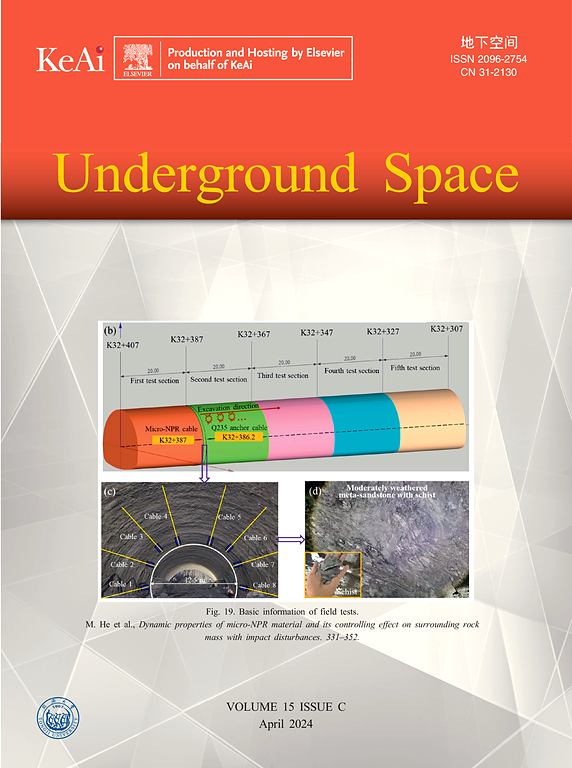Experimental study on the modulus of soil reaction for plastic pipes buried in lightweight cellular concrete backfill
IF 8.3
1区 工程技术
Q1 ENGINEERING, CIVIL
引用次数: 0
Abstract
The modulus of soil reaction, representing the stiffness of a soil surrounding pipes, is a critical parameter in the design of buried flexible pipes. This study conducted plate loading tests on corrugated polyvinyl chloride, smooth polyvinyl chloride, and high-density polyethylene pipes buried in lightweight cellular concrete (LCC) backfills at densities of 400, 475, 550, and 650 kg/m3 to investigate the pipe deformation behavior and moduli of soil reaction. In addition, this study examined the effects of the narrow trench condition on the pipe deformation and modulus of soil reaction. In these tests, the vertical and horizontal diameter changes of pipes under the vertical pressures applied through a hydraulic jack were measured. Test results reveal that the average moduli of soil reaction of plastic pipes within a wide trench backfilled by the LCCs at densities of 400, 475, 550, and 650 kg/m3 were back-calculated as 66, 99, 133, and 205 MPa, respectively, using the modified Iowa formula. Furthermore, the back-calculated moduli of soil reaction for LCCs exhibited linear relationships with their densities and unconfined compressive strengths and were higher than the recommended values for the commonly used soil backfills. Based on the vertical deformation criterion of 5% pipe diameter, the ultimate bearing capacities of flexible pipes buried in wide LCCs at densities of 475, 550, and 650 kg/m3 exceeded 500 kPa. The LCC with a narrow trench exhibited a lower modulus of soil reaction and ultimate bearing capacity but a larger pipe diameter change.
轻量泡沫混凝土回填体埋置塑料管土反力模量试验研究
土反力模量代表管道周围土体的刚度,是埋地柔性管道设计中的关键参数。本研究对轻质泡沫混凝土(LCC)充填体中埋置密度为400、475、550和650 kg/m3的波纹聚氯乙烯、光滑聚氯乙烯和高密度聚乙烯管材进行板载试验,研究管材的变形行为和土体反应模量。此外,研究了窄沟条件对管道变形和土体反力模量的影响。在这些试验中,测量了通过液压千斤顶施加垂直压力下管道的垂直和水平直径变化。试验结果表明,采用修正的爱荷华公式,在密度为400、475、550和650 kg/m3的宽沟槽内回填塑料管道的平均土反力模量分别为66、99、133和205 MPa。此外,lcc的反算模量与其密度和无侧限抗压强度呈线性关系,且高于常用土填体的推荐值。根据5%管径竖向变形准则,在475、550和650 kg/m3密度下,宽幅lcc中埋管的极限承载力均超过500 kPa。窄沟槽结构的土反力模量和极限承载力较低,但管径变化较大。
本文章由计算机程序翻译,如有差异,请以英文原文为准。
求助全文
约1分钟内获得全文
求助全文
来源期刊

Underground Space
ENGINEERING, CIVIL-
CiteScore
10.20
自引率
14.10%
发文量
71
审稿时长
63 days
期刊介绍:
Underground Space is an open access international journal without article processing charges (APC) committed to serving as a scientific forum for researchers and practitioners in the field of underground engineering. The journal welcomes manuscripts that deal with original theories, methods, technologies, and important applications throughout the life-cycle of underground projects, including planning, design, operation and maintenance, disaster prevention, and demolition. The journal is particularly interested in manuscripts related to the latest development of smart underground engineering from the perspectives of resilience, resources saving, environmental friendliness, humanity, and artificial intelligence. The manuscripts are expected to have significant innovation and potential impact in the field of underground engineering, and should have clear association with or application in underground projects.
 求助内容:
求助内容: 应助结果提醒方式:
应助结果提醒方式:


